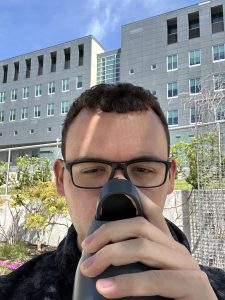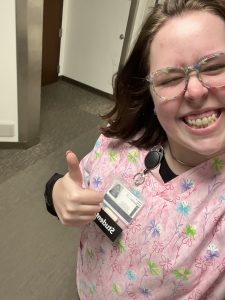22 Personal Reflections
John’s Reflection
As an environmental engineer, I strive to be environmentally conscious and responsible in both my personal and professional life. I make a consistent effort to recycle properly and dispose of waste in the appropriate bins, even encouraging—sometimes persistently—my friends and family to do the same. Admittedly, I wasn’t always this mindful. I used to rely heavily on single-use plastic water bottles out of convenience, simply because I didn’t want to wash reusable ones. However, in recent years, I’ve made a more deliberate effort to reduce my plastic footprint. I now bring reusable bags to the grocery store and have switched to using metal water bottles as part of my daily routine.
Until last year, I was unaware of the extent of the microplastic and nanoplastic pollution problem. I had long understood that plastic waste was a serious environmental issue, worsened by industrial growth and a culture of overconsumption. What I didn’t realize was that there are vast, invisible quantities of plastic particles present in places we wouldn’t expect—air, soil, food, and even our bodies. Through this project, I’ve gained a much deeper understanding of how pervasive and persistent microplastic pollution truly is.
This new knowledge has reshaped how I view my own habits and responsibilities. I am more committed than ever to reducing my plastic use and making informed choices, not only to protect my health but also to contribute to broader environmental efforts. While the issue of microplastics is complex and global in scale, I believe that change can start with individual action. I intend to continue doing my part to address the problem—both in my personal life and as a future professional in the environmental field.

Cora’s Reflection
I have always been known as the person that is yelling at everyone about recycling their cans and bringing reusable grocery bags amongst my friends and family. I have always been a large advocate against the use on single use plastic in most of my day-to-day life. I lived by this until I got to college. Once I was in school and living on my own, I realized how expensive and inaccessible it is. Being able to purchase higher quality items that produce lower waste either in production or consumption was such a privilege that I didn’t realize that I had growing up. Since then, I am still an advocate for individuals reducing their own plastic waste but now I am working on fighting the large corporations that continue to push plastic onto the consumer to the point where there are no other options out there.
As a public health major but also a lab technician at UIHC, I have a lot of cognitive dissonance when it comes to my personal life, I try to use minimal plastic but at work, I use SO MUCH plastic. Everything has to remain sterile and clean and to do that we have to use new equipment for every specimen. This also means that we have to throw everything away when we are done testing the specimen. I completely understand that this process exists for the safety of both patients and healthcare workers, but I just wish there was some alternative to these methods. Hopefully, as research continues into microplastics and plastic waste, more alternatives will be developed.

Jahanvi’s Reflection
Water quality has always been a significant concern in my life, both locally and globally. Growing up in Iowa, I learned early on that even in the U.S., our water isn’t always as clean as it should be. The high nitrate levels caused by agricultural runoff are a known issue, but in recent years, I’ve also become increasingly concerned about less visible pollutants—especially microplastics. Knowing that tiny particles from plastic waste can pass through municipal water filtration systems has changed how I view the water I drink every day. My family has always used water filters for cooking and drinking. While tap water was considered safe, I always found myself worrying about everything that was not filtered out by these systems, such as microplastics, which are not always effectively removed by standard filters.
Not only was this a problem at home, but when I visited family in India, the issue became even more severe. There, bottled water was not a choice—it was a necessity. The tap water is often unsafe due to contamination from industrial plastic waste among other things. On top of this, consuming high amounts of bottled water still meant that I was exposed to microplastics. Ironically, the very plastic bottles that provided a sense of safety were also contributing to the global crisis of plastic waste.
Whether in India or Iowa, the presence of microplastics in water is increasingly hard to avoid. These experiences have shaped how I think about environmental health, sustainability, and my own role in contributing to the problem. Clean water should be a basic right, yet our consumption habits, particularly our reliance on plastic, are undermining that right across the globe.
As I have gotten older, I’ve become more aware of my daily plastic usage and its long-term impacts. Whether it’s the number of plastic grocery bags I use, the disposable coffee cups I grab on the go, or the packaging from everyday products, I’ve realized that convenience often comes at an environmental cost. Within the past few years I have found myself opting to use more reusable bags and attempting to cut down my plastic consumption. While these are small actions, they stem from a very personal understanding that the quality of the water I consume is directly tied to the choices I make.

